Analysis of Enron Scandal: Ethics, Corporate Governance, and SOX Act
VerifiedAdded on 2023/01/05
|7
|1899
|36
Report
AI Summary
This report provides a comprehensive analysis of the Enron scandal, detailing the ethical breaches and corporate governance failures that led to the company's collapse. It explores the role of unethical accounting practices, the unrestricted power of executives, and the lack of ethical corporate governance within Enron. The report examines the Sarbanes-Oxley Act of 2002 (SOX) as a response to the scandal, highlighting its impact on corporate governance, financial reporting, and auditing procedures. It discusses the act's provisions for reducing loopholes, strengthening corporate governance rules, and increasing accountability. Furthermore, the report delves into ethical reasoning approaches, such as principles-based, consequences-based, and virtue-based ethics, to explain the unethical behavior within Enron. The conclusion emphasizes the importance of ethics in organizations, the impact of unethical practices, and the role of government in preventing fraudulent activities through legislation and regulatory oversight.
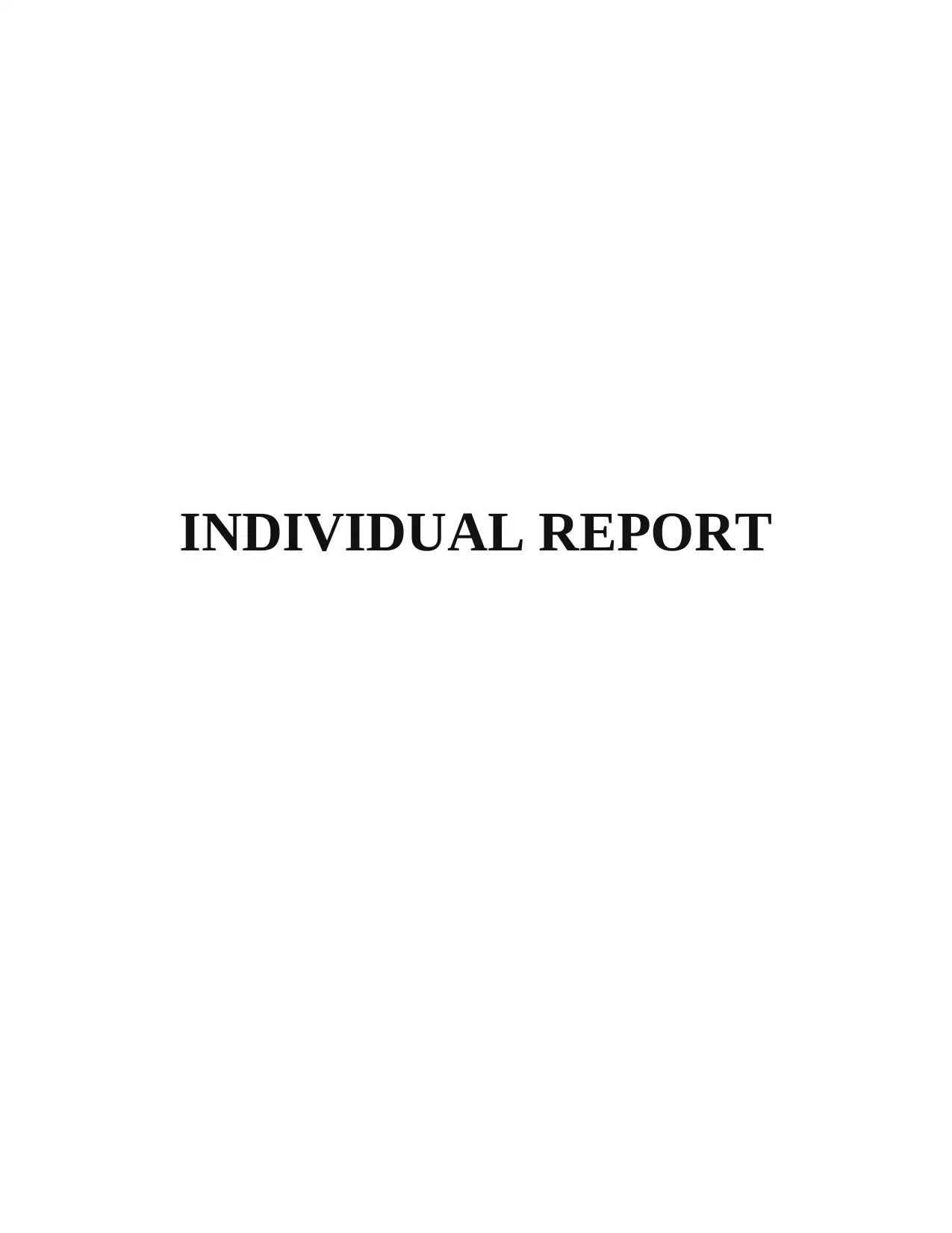
INDIVIDUAL REPORT
Paraphrase This Document
Need a fresh take? Get an instant paraphrase of this document with our AI Paraphraser
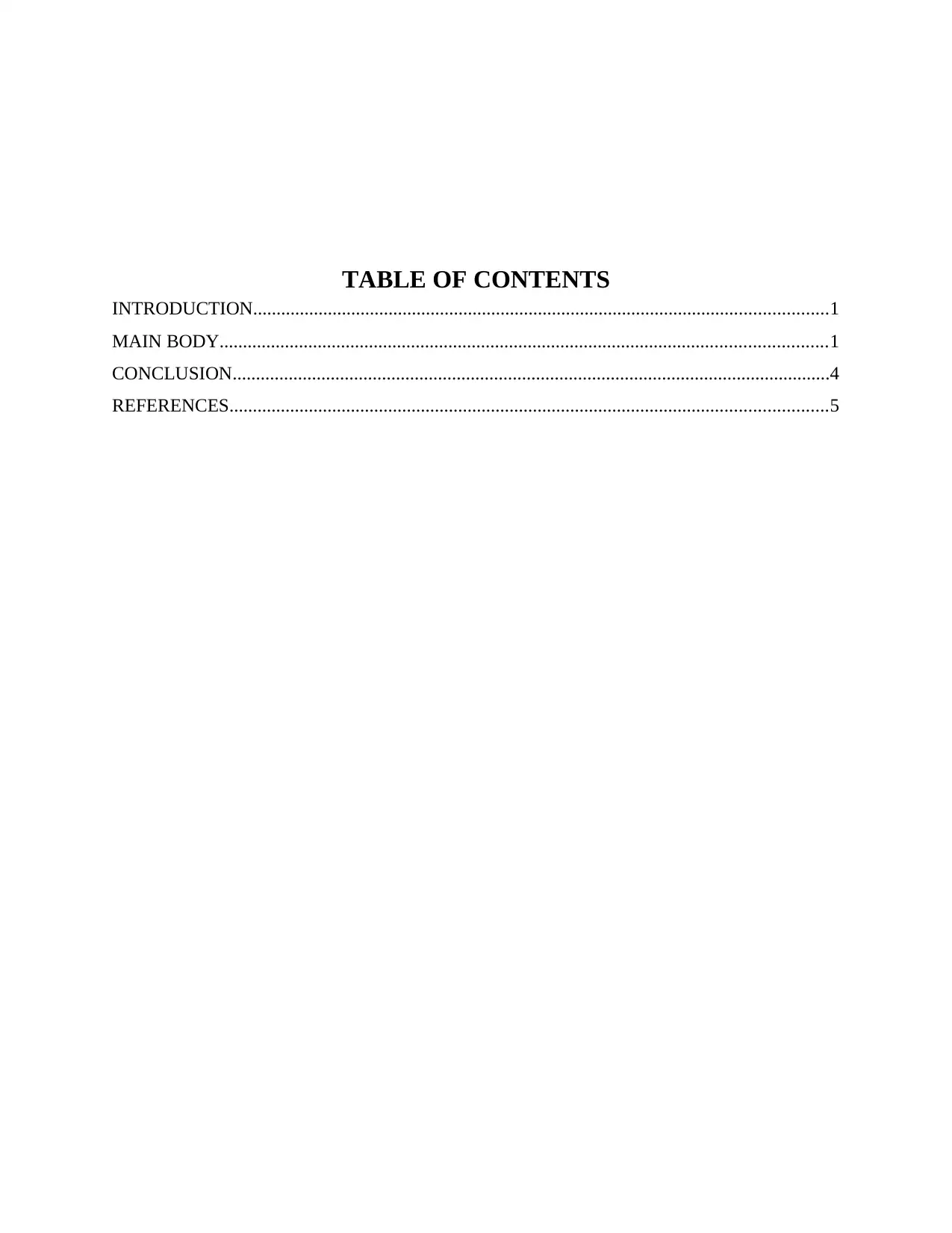
TABLE OF CONTENTS
INTRODUCTION...........................................................................................................................1
MAIN BODY..................................................................................................................................1
CONCLUSION................................................................................................................................4
REFERENCES................................................................................................................................5
INTRODUCTION...........................................................................................................................1
MAIN BODY..................................................................................................................................1
CONCLUSION................................................................................................................................4
REFERENCES................................................................................................................................5
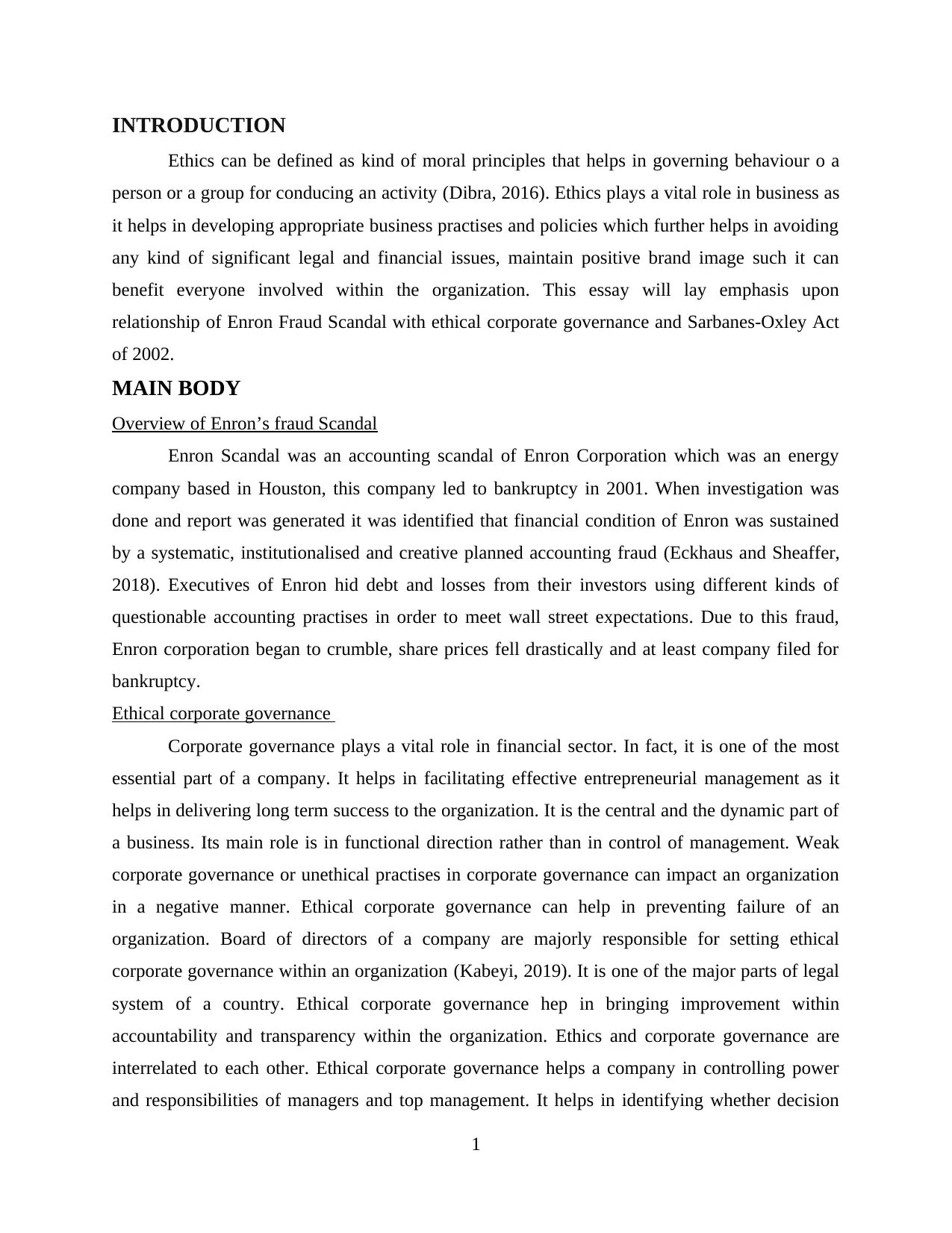
INTRODUCTION
Ethics can be defined as kind of moral principles that helps in governing behaviour o a
person or a group for conducing an activity (Dibra, 2016). Ethics plays a vital role in business as
it helps in developing appropriate business practises and policies which further helps in avoiding
any kind of significant legal and financial issues, maintain positive brand image such it can
benefit everyone involved within the organization. This essay will lay emphasis upon
relationship of Enron Fraud Scandal with ethical corporate governance and Sarbanes-Oxley Act
of 2002.
MAIN BODY
Overview of Enron’s fraud Scandal
Enron Scandal was an accounting scandal of Enron Corporation which was an energy
company based in Houston, this company led to bankruptcy in 2001. When investigation was
done and report was generated it was identified that financial condition of Enron was sustained
by a systematic, institutionalised and creative planned accounting fraud (Eckhaus and Sheaffer,
2018). Executives of Enron hid debt and losses from their investors using different kinds of
questionable accounting practises in order to meet wall street expectations. Due to this fraud,
Enron corporation began to crumble, share prices fell drastically and at least company filed for
bankruptcy.
Ethical corporate governance
Corporate governance plays a vital role in financial sector. In fact, it is one of the most
essential part of a company. It helps in facilitating effective entrepreneurial management as it
helps in delivering long term success to the organization. It is the central and the dynamic part of
a business. Its main role is in functional direction rather than in control of management. Weak
corporate governance or unethical practises in corporate governance can impact an organization
in a negative manner. Ethical corporate governance can help in preventing failure of an
organization. Board of directors of a company are majorly responsible for setting ethical
corporate governance within an organization (Kabeyi, 2019). It is one of the major parts of legal
system of a country. Ethical corporate governance hep in bringing improvement within
accountability and transparency within the organization. Ethics and corporate governance are
interrelated to each other. Ethical corporate governance helps a company in controlling power
and responsibilities of managers and top management. It helps in identifying whether decision
1
Ethics can be defined as kind of moral principles that helps in governing behaviour o a
person or a group for conducing an activity (Dibra, 2016). Ethics plays a vital role in business as
it helps in developing appropriate business practises and policies which further helps in avoiding
any kind of significant legal and financial issues, maintain positive brand image such it can
benefit everyone involved within the organization. This essay will lay emphasis upon
relationship of Enron Fraud Scandal with ethical corporate governance and Sarbanes-Oxley Act
of 2002.
MAIN BODY
Overview of Enron’s fraud Scandal
Enron Scandal was an accounting scandal of Enron Corporation which was an energy
company based in Houston, this company led to bankruptcy in 2001. When investigation was
done and report was generated it was identified that financial condition of Enron was sustained
by a systematic, institutionalised and creative planned accounting fraud (Eckhaus and Sheaffer,
2018). Executives of Enron hid debt and losses from their investors using different kinds of
questionable accounting practises in order to meet wall street expectations. Due to this fraud,
Enron corporation began to crumble, share prices fell drastically and at least company filed for
bankruptcy.
Ethical corporate governance
Corporate governance plays a vital role in financial sector. In fact, it is one of the most
essential part of a company. It helps in facilitating effective entrepreneurial management as it
helps in delivering long term success to the organization. It is the central and the dynamic part of
a business. Its main role is in functional direction rather than in control of management. Weak
corporate governance or unethical practises in corporate governance can impact an organization
in a negative manner. Ethical corporate governance can help in preventing failure of an
organization. Board of directors of a company are majorly responsible for setting ethical
corporate governance within an organization (Kabeyi, 2019). It is one of the major parts of legal
system of a country. Ethical corporate governance hep in bringing improvement within
accountability and transparency within the organization. Ethics and corporate governance are
interrelated to each other. Ethical corporate governance helps a company in controlling power
and responsibilities of managers and top management. It helps in identifying whether decision
1
⊘ This is a preview!⊘
Do you want full access?
Subscribe today to unlock all pages.

Trusted by 1+ million students worldwide
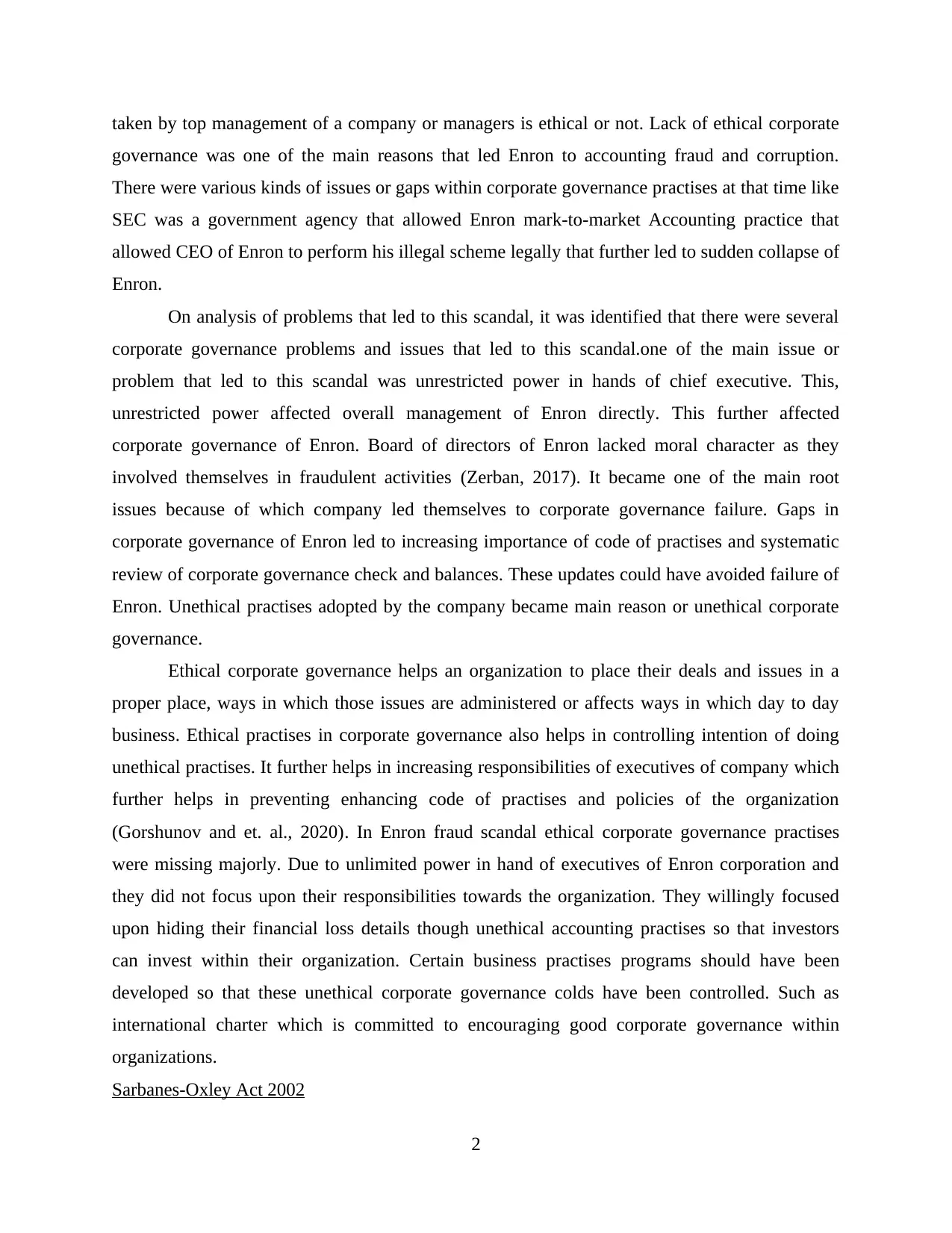
taken by top management of a company or managers is ethical or not. Lack of ethical corporate
governance was one of the main reasons that led Enron to accounting fraud and corruption.
There were various kinds of issues or gaps within corporate governance practises at that time like
SEC was a government agency that allowed Enron mark-to-market Accounting practice that
allowed CEO of Enron to perform his illegal scheme legally that further led to sudden collapse of
Enron.
On analysis of problems that led to this scandal, it was identified that there were several
corporate governance problems and issues that led to this scandal.one of the main issue or
problem that led to this scandal was unrestricted power in hands of chief executive. This,
unrestricted power affected overall management of Enron directly. This further affected
corporate governance of Enron. Board of directors of Enron lacked moral character as they
involved themselves in fraudulent activities (Zerban, 2017). It became one of the main root
issues because of which company led themselves to corporate governance failure. Gaps in
corporate governance of Enron led to increasing importance of code of practises and systematic
review of corporate governance check and balances. These updates could have avoided failure of
Enron. Unethical practises adopted by the company became main reason or unethical corporate
governance.
Ethical corporate governance helps an organization to place their deals and issues in a
proper place, ways in which those issues are administered or affects ways in which day to day
business. Ethical practises in corporate governance also helps in controlling intention of doing
unethical practises. It further helps in increasing responsibilities of executives of company which
further helps in preventing enhancing code of practises and policies of the organization
(Gorshunov and et. al., 2020). In Enron fraud scandal ethical corporate governance practises
were missing majorly. Due to unlimited power in hand of executives of Enron corporation and
they did not focus upon their responsibilities towards the organization. They willingly focused
upon hiding their financial loss details though unethical accounting practises so that investors
can invest within their organization. Certain business practises programs should have been
developed so that these unethical corporate governance colds have been controlled. Such as
international charter which is committed to encouraging good corporate governance within
organizations.
Sarbanes-Oxley Act 2002
2
governance was one of the main reasons that led Enron to accounting fraud and corruption.
There were various kinds of issues or gaps within corporate governance practises at that time like
SEC was a government agency that allowed Enron mark-to-market Accounting practice that
allowed CEO of Enron to perform his illegal scheme legally that further led to sudden collapse of
Enron.
On analysis of problems that led to this scandal, it was identified that there were several
corporate governance problems and issues that led to this scandal.one of the main issue or
problem that led to this scandal was unrestricted power in hands of chief executive. This,
unrestricted power affected overall management of Enron directly. This further affected
corporate governance of Enron. Board of directors of Enron lacked moral character as they
involved themselves in fraudulent activities (Zerban, 2017). It became one of the main root
issues because of which company led themselves to corporate governance failure. Gaps in
corporate governance of Enron led to increasing importance of code of practises and systematic
review of corporate governance check and balances. These updates could have avoided failure of
Enron. Unethical practises adopted by the company became main reason or unethical corporate
governance.
Ethical corporate governance helps an organization to place their deals and issues in a
proper place, ways in which those issues are administered or affects ways in which day to day
business. Ethical practises in corporate governance also helps in controlling intention of doing
unethical practises. It further helps in increasing responsibilities of executives of company which
further helps in preventing enhancing code of practises and policies of the organization
(Gorshunov and et. al., 2020). In Enron fraud scandal ethical corporate governance practises
were missing majorly. Due to unlimited power in hand of executives of Enron corporation and
they did not focus upon their responsibilities towards the organization. They willingly focused
upon hiding their financial loss details though unethical accounting practises so that investors
can invest within their organization. Certain business practises programs should have been
developed so that these unethical corporate governance colds have been controlled. Such as
international charter which is committed to encouraging good corporate governance within
organizations.
Sarbanes-Oxley Act 2002
2
Paraphrase This Document
Need a fresh take? Get an instant paraphrase of this document with our AI Paraphraser
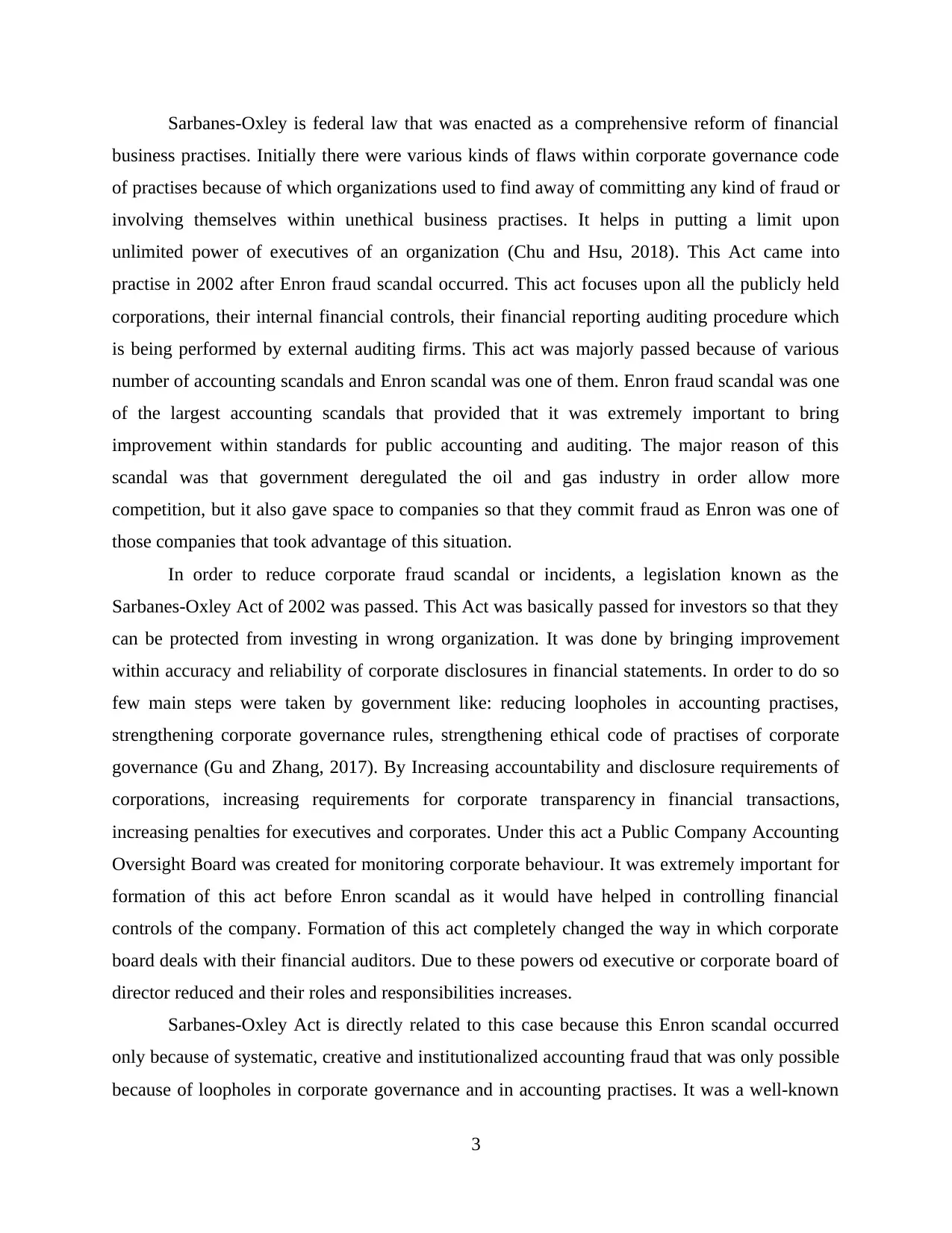
Sarbanes-Oxley is federal law that was enacted as a comprehensive reform of financial
business practises. Initially there were various kinds of flaws within corporate governance code
of practises because of which organizations used to find away of committing any kind of fraud or
involving themselves within unethical business practises. It helps in putting a limit upon
unlimited power of executives of an organization (Chu and Hsu, 2018). This Act came into
practise in 2002 after Enron fraud scandal occurred. This act focuses upon all the publicly held
corporations, their internal financial controls, their financial reporting auditing procedure which
is being performed by external auditing firms. This act was majorly passed because of various
number of accounting scandals and Enron scandal was one of them. Enron fraud scandal was one
of the largest accounting scandals that provided that it was extremely important to bring
improvement within standards for public accounting and auditing. The major reason of this
scandal was that government deregulated the oil and gas industry in order allow more
competition, but it also gave space to companies so that they commit fraud as Enron was one of
those companies that took advantage of this situation.
In order to reduce corporate fraud scandal or incidents, a legislation known as the
Sarbanes-Oxley Act of 2002 was passed. This Act was basically passed for investors so that they
can be protected from investing in wrong organization. It was done by bringing improvement
within accuracy and reliability of corporate disclosures in financial statements. In order to do so
few main steps were taken by government like: reducing loopholes in accounting practises,
strengthening corporate governance rules, strengthening ethical code of practises of corporate
governance (Gu and Zhang, 2017). By Increasing accountability and disclosure requirements of
corporations, increasing requirements for corporate transparency in financial transactions,
increasing penalties for executives and corporates. Under this act a Public Company Accounting
Oversight Board was created for monitoring corporate behaviour. It was extremely important for
formation of this act before Enron scandal as it would have helped in controlling financial
controls of the company. Formation of this act completely changed the way in which corporate
board deals with their financial auditors. Due to these powers od executive or corporate board of
director reduced and their roles and responsibilities increases.
Sarbanes-Oxley Act is directly related to this case because this Enron scandal occurred
only because of systematic, creative and institutionalized accounting fraud that was only possible
because of loopholes in corporate governance and in accounting practises. It was a well-known
3
business practises. Initially there were various kinds of flaws within corporate governance code
of practises because of which organizations used to find away of committing any kind of fraud or
involving themselves within unethical business practises. It helps in putting a limit upon
unlimited power of executives of an organization (Chu and Hsu, 2018). This Act came into
practise in 2002 after Enron fraud scandal occurred. This act focuses upon all the publicly held
corporations, their internal financial controls, their financial reporting auditing procedure which
is being performed by external auditing firms. This act was majorly passed because of various
number of accounting scandals and Enron scandal was one of them. Enron fraud scandal was one
of the largest accounting scandals that provided that it was extremely important to bring
improvement within standards for public accounting and auditing. The major reason of this
scandal was that government deregulated the oil and gas industry in order allow more
competition, but it also gave space to companies so that they commit fraud as Enron was one of
those companies that took advantage of this situation.
In order to reduce corporate fraud scandal or incidents, a legislation known as the
Sarbanes-Oxley Act of 2002 was passed. This Act was basically passed for investors so that they
can be protected from investing in wrong organization. It was done by bringing improvement
within accuracy and reliability of corporate disclosures in financial statements. In order to do so
few main steps were taken by government like: reducing loopholes in accounting practises,
strengthening corporate governance rules, strengthening ethical code of practises of corporate
governance (Gu and Zhang, 2017). By Increasing accountability and disclosure requirements of
corporations, increasing requirements for corporate transparency in financial transactions,
increasing penalties for executives and corporates. Under this act a Public Company Accounting
Oversight Board was created for monitoring corporate behaviour. It was extremely important for
formation of this act before Enron scandal as it would have helped in controlling financial
controls of the company. Formation of this act completely changed the way in which corporate
board deals with their financial auditors. Due to these powers od executive or corporate board of
director reduced and their roles and responsibilities increases.
Sarbanes-Oxley Act is directly related to this case because this Enron scandal occurred
only because of systematic, creative and institutionalized accounting fraud that was only possible
because of loopholes in corporate governance and in accounting practises. It was a well-known
3
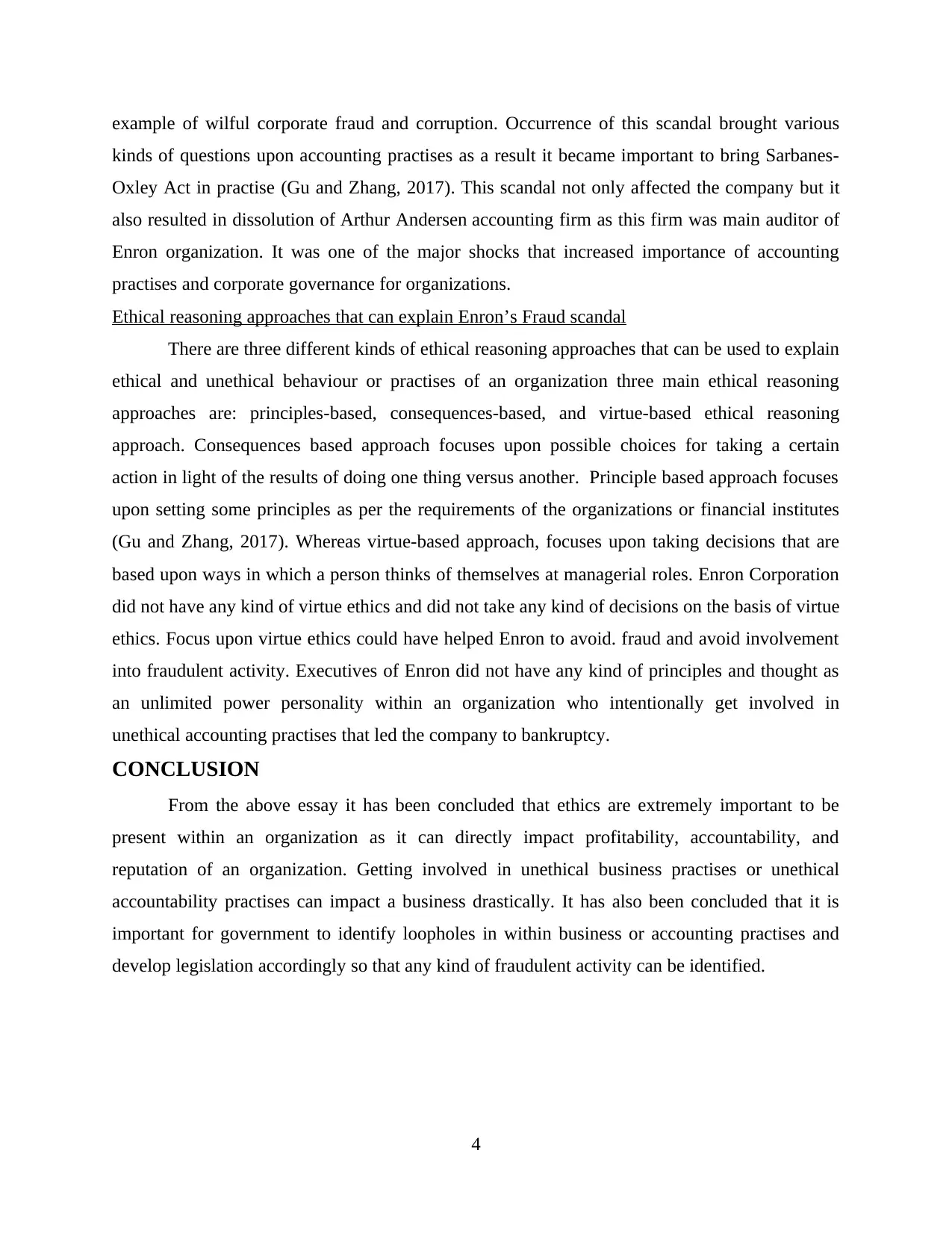
example of wilful corporate fraud and corruption. Occurrence of this scandal brought various
kinds of questions upon accounting practises as a result it became important to bring Sarbanes-
Oxley Act in practise (Gu and Zhang, 2017). This scandal not only affected the company but it
also resulted in dissolution of Arthur Andersen accounting firm as this firm was main auditor of
Enron organization. It was one of the major shocks that increased importance of accounting
practises and corporate governance for organizations.
Ethical reasoning approaches that can explain Enron’s Fraud scandal
There are three different kinds of ethical reasoning approaches that can be used to explain
ethical and unethical behaviour or practises of an organization three main ethical reasoning
approaches are: principles-based, consequences-based, and virtue-based ethical reasoning
approach. Consequences based approach focuses upon possible choices for taking a certain
action in light of the results of doing one thing versus another. Principle based approach focuses
upon setting some principles as per the requirements of the organizations or financial institutes
(Gu and Zhang, 2017). Whereas virtue-based approach, focuses upon taking decisions that are
based upon ways in which a person thinks of themselves at managerial roles. Enron Corporation
did not have any kind of virtue ethics and did not take any kind of decisions on the basis of virtue
ethics. Focus upon virtue ethics could have helped Enron to avoid. fraud and avoid involvement
into fraudulent activity. Executives of Enron did not have any kind of principles and thought as
an unlimited power personality within an organization who intentionally get involved in
unethical accounting practises that led the company to bankruptcy.
CONCLUSION
From the above essay it has been concluded that ethics are extremely important to be
present within an organization as it can directly impact profitability, accountability, and
reputation of an organization. Getting involved in unethical business practises or unethical
accountability practises can impact a business drastically. It has also been concluded that it is
important for government to identify loopholes in within business or accounting practises and
develop legislation accordingly so that any kind of fraudulent activity can be identified.
4
kinds of questions upon accounting practises as a result it became important to bring Sarbanes-
Oxley Act in practise (Gu and Zhang, 2017). This scandal not only affected the company but it
also resulted in dissolution of Arthur Andersen accounting firm as this firm was main auditor of
Enron organization. It was one of the major shocks that increased importance of accounting
practises and corporate governance for organizations.
Ethical reasoning approaches that can explain Enron’s Fraud scandal
There are three different kinds of ethical reasoning approaches that can be used to explain
ethical and unethical behaviour or practises of an organization three main ethical reasoning
approaches are: principles-based, consequences-based, and virtue-based ethical reasoning
approach. Consequences based approach focuses upon possible choices for taking a certain
action in light of the results of doing one thing versus another. Principle based approach focuses
upon setting some principles as per the requirements of the organizations or financial institutes
(Gu and Zhang, 2017). Whereas virtue-based approach, focuses upon taking decisions that are
based upon ways in which a person thinks of themselves at managerial roles. Enron Corporation
did not have any kind of virtue ethics and did not take any kind of decisions on the basis of virtue
ethics. Focus upon virtue ethics could have helped Enron to avoid. fraud and avoid involvement
into fraudulent activity. Executives of Enron did not have any kind of principles and thought as
an unlimited power personality within an organization who intentionally get involved in
unethical accounting practises that led the company to bankruptcy.
CONCLUSION
From the above essay it has been concluded that ethics are extremely important to be
present within an organization as it can directly impact profitability, accountability, and
reputation of an organization. Getting involved in unethical business practises or unethical
accountability practises can impact a business drastically. It has also been concluded that it is
important for government to identify loopholes in within business or accounting practises and
develop legislation accordingly so that any kind of fraudulent activity can be identified.
4
⊘ This is a preview!⊘
Do you want full access?
Subscribe today to unlock all pages.

Trusted by 1+ million students worldwide
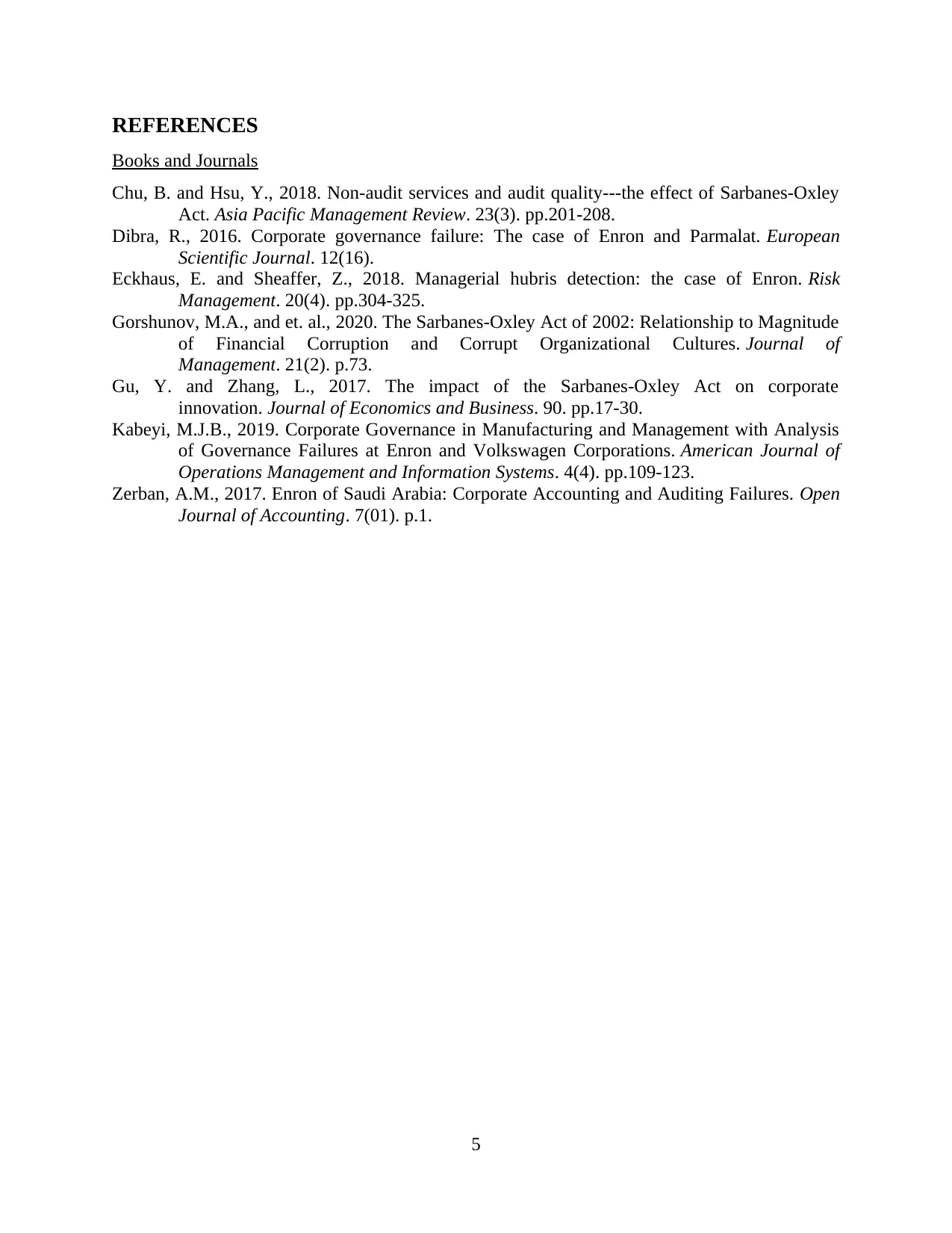
REFERENCES
Books and Journals
Chu, B. and Hsu, Y., 2018. Non-audit services and audit quality---the effect of Sarbanes-Oxley
Act. Asia Pacific Management Review. 23(3). pp.201-208.
Dibra, R., 2016. Corporate governance failure: The case of Enron and Parmalat. European
Scientific Journal. 12(16).
Eckhaus, E. and Sheaffer, Z., 2018. Managerial hubris detection: the case of Enron. Risk
Management. 20(4). pp.304-325.
Gorshunov, M.A., and et. al., 2020. The Sarbanes-Oxley Act of 2002: Relationship to Magnitude
of Financial Corruption and Corrupt Organizational Cultures. Journal of
Management. 21(2). p.73.
Gu, Y. and Zhang, L., 2017. The impact of the Sarbanes-Oxley Act on corporate
innovation. Journal of Economics and Business. 90. pp.17-30.
Kabeyi, M.J.B., 2019. Corporate Governance in Manufacturing and Management with Analysis
of Governance Failures at Enron and Volkswagen Corporations. American Journal of
Operations Management and Information Systems. 4(4). pp.109-123.
Zerban, A.M., 2017. Enron of Saudi Arabia: Corporate Accounting and Auditing Failures. Open
Journal of Accounting. 7(01). p.1.
5
Books and Journals
Chu, B. and Hsu, Y., 2018. Non-audit services and audit quality---the effect of Sarbanes-Oxley
Act. Asia Pacific Management Review. 23(3). pp.201-208.
Dibra, R., 2016. Corporate governance failure: The case of Enron and Parmalat. European
Scientific Journal. 12(16).
Eckhaus, E. and Sheaffer, Z., 2018. Managerial hubris detection: the case of Enron. Risk
Management. 20(4). pp.304-325.
Gorshunov, M.A., and et. al., 2020. The Sarbanes-Oxley Act of 2002: Relationship to Magnitude
of Financial Corruption and Corrupt Organizational Cultures. Journal of
Management. 21(2). p.73.
Gu, Y. and Zhang, L., 2017. The impact of the Sarbanes-Oxley Act on corporate
innovation. Journal of Economics and Business. 90. pp.17-30.
Kabeyi, M.J.B., 2019. Corporate Governance in Manufacturing and Management with Analysis
of Governance Failures at Enron and Volkswagen Corporations. American Journal of
Operations Management and Information Systems. 4(4). pp.109-123.
Zerban, A.M., 2017. Enron of Saudi Arabia: Corporate Accounting and Auditing Failures. Open
Journal of Accounting. 7(01). p.1.
5
1 out of 7
Related Documents
Your All-in-One AI-Powered Toolkit for Academic Success.
+13062052269
info@desklib.com
Available 24*7 on WhatsApp / Email
![[object Object]](/_next/static/media/star-bottom.7253800d.svg)
Unlock your academic potential
Copyright © 2020–2026 A2Z Services. All Rights Reserved. Developed and managed by ZUCOL.





